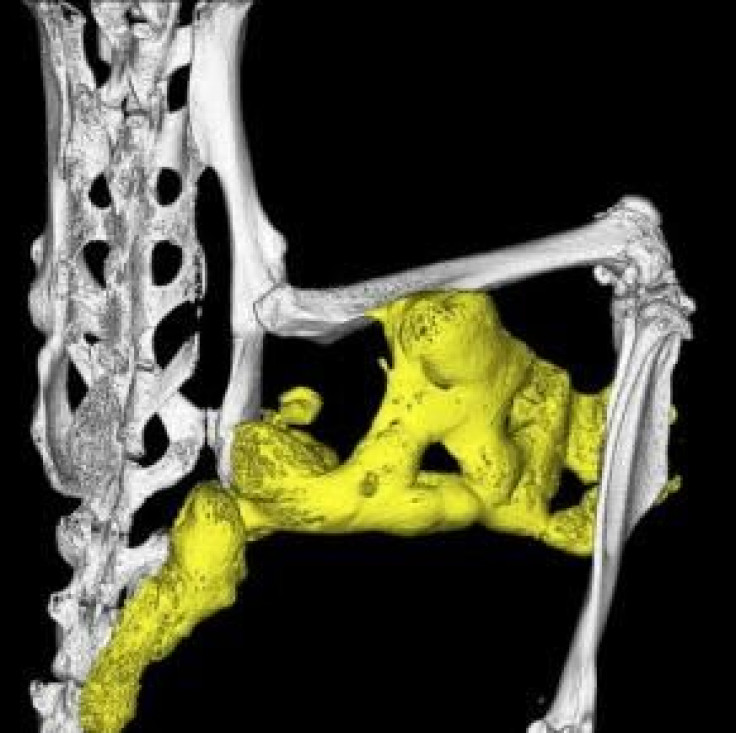Regeneron Scientists Discover Key To Excess Bone Growth In Rare Disease

CHICAGO (Reuters) - Scientists at U.S. biotechnology company Regeneron Pharmaceuticals researching a rare genetic disease that traps sufferers in a second skeleton have discovered a treatment that shuts down excessive bone growth in mice engineered to develop the illness.
Company scientists said on Wednesday the protein Activin-A, which normally blocks bone growth, triggers hyperactive bone growth in patients with a genetic mutation that causes the disease. The disease is known as Fibrodysplasia Ossificans Progressiva, or FOP.
The researchers showed that an antibody that blocks Activin-A helped shut down the growth signal in genetically modified mice. The effect lasted as long as six weeks, according to the study, published in the journal Science Translational Medicine.
Aris Economides, executive director of skeletal diseases and co-founder of the Regeneron Genetics Center, said the findings could eventually lead to a treatment for the disease. FOP is a lethal genetic disorder in which muscle and soft tissue gradually are replaced by bone, forming an extra skeleton that immobilizes and eventually suffocates patients.
The condition currently affects 800 people globally, including 200 in the United States.
FOP is caused by mutations in the gene ACVR1 which makes a receptor that controls bone growth in cells. Regeneron discovered that this mutated receptor has an abnormal response in the presence of Activin-A, a growth factor often secreted by the immune system in response to injury and inflammation.
Normally, Activin-A blocks the receptor, putting the brakes on bone growth. In individuals with the FOP mutation, Activin-A has the opposite effect. "It's as if the brakes are hot-wired to the gas pedal," Economides told Reuters.
The finding explains how abnormal bone forms in FOP patients, often in response to injuries or illness that cause tissue swelling or inflammation, he said.
To test their finding, researchers developed a therapeutic antibody designed to block Activin-A. When injected in mice that developed a form of the disease, the drug blocked the formation of excess bone.
Economides said the antibody works in a similar way to Regeneron and Sanofi's newly approved antibody drug Praluent, a cholesterol-lowering drug which blocks a receptor called PSCK9 on liver cells that controls the removal of "bad" LDL cholesterol.
Betsy Bogard, director of global research development for the International FOP Association and the sister of an FOP patient, called Regeneron's findings "incredibly exciting," as they help explain some of science behind FOP and also raise hope for a new treatment approach.
But Bogard, who is a former executive of the drug company Genzyme, a unit of Sanofi, remained cautious.
"The road of developing drugs is long and difficult. There is still much to learn," she said.
Although the company would not disclose details or timing of its development approach, Regeneron spokeswoman Alexandra Bowie said preclinical testing is ongoing, and the company hopes to move the treatment into human trials.
Clementia Pharmaceuticals Inc, a private Montreal-based company, is also studying FOP and is testing a compound called palovarotene. The drug is a repurposed compound acquired from Roche that aims to interrupt the process of bone formation during disease flare-ups. It is now being tested in a phase 2 trial in FOP patients.
Last month, Clementia expanded the trial to include children as young as 6, and said it expects to start phase 3 testing in the second half of next year.
(Reporting by Julie Steenhuysen; Editing by Frances Kerry)



























